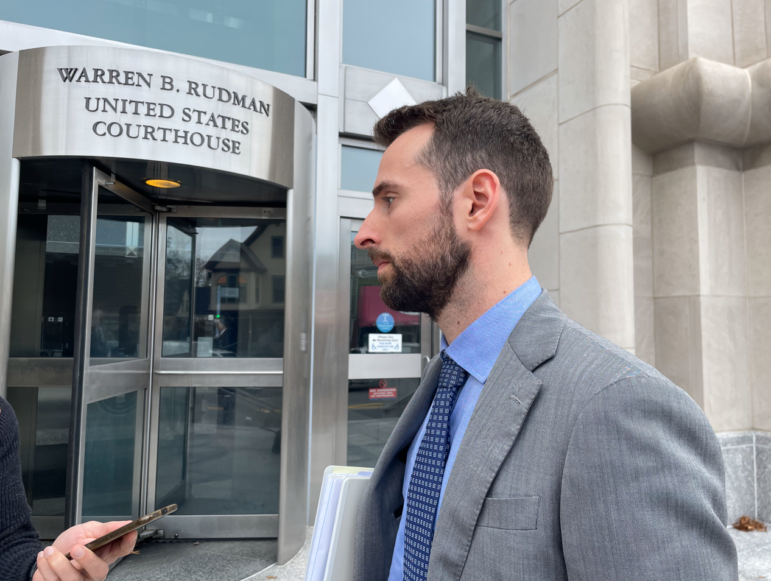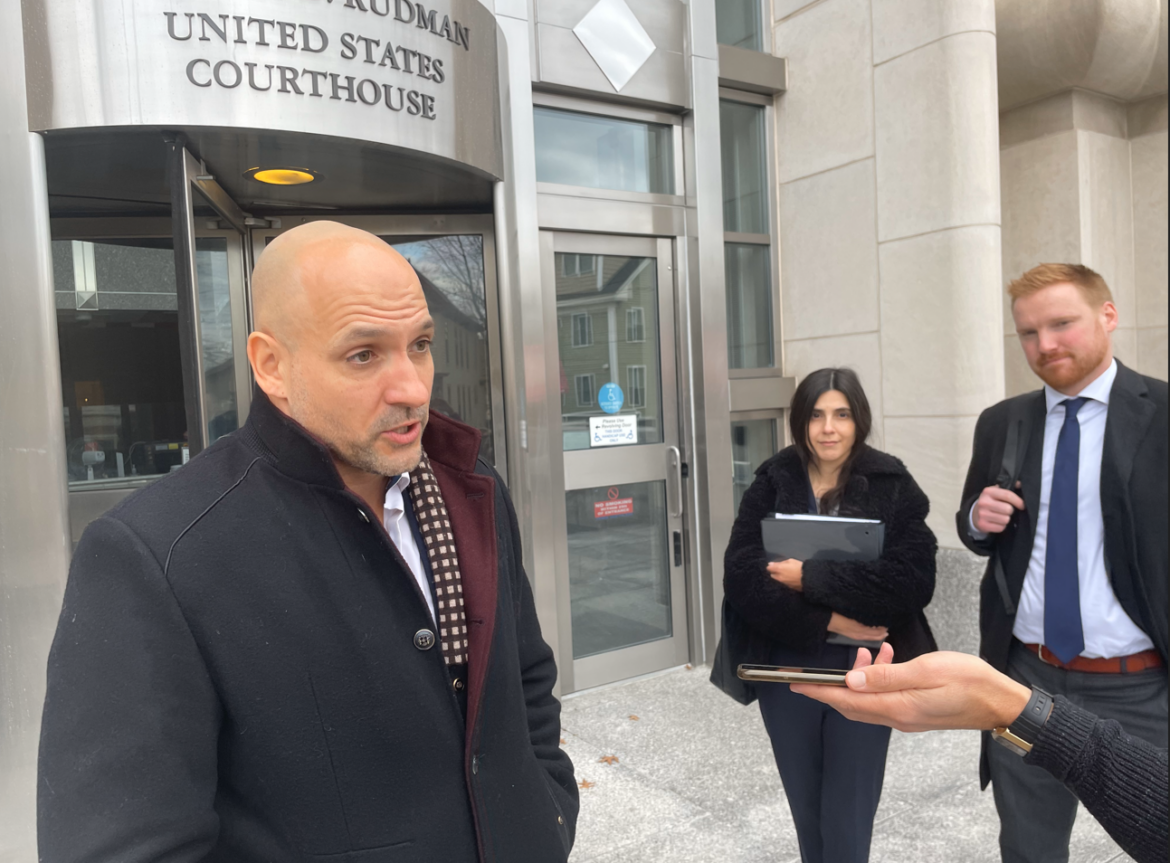
Above, Senior Assistant Attorney General Sam Garland is pictured outside U.S. District Court in Concord Monday speaking about the current practice of telephone court hearings for those facing involuntary commitment for mental health reasons. PAULA TRACY photo
By PAULA TRACY, InDepthNH.org
CONCORD – Should a person who is facing involuntary commitment for a mental health crisis be able to see the state Circuit Court judge who is deciding his or her freedom, or is it enough to just have a phone hearing?
That is the central question being put to U.S. District Court Chief Judge Landya B. McCafferty, who heard motions on Monday on an amendment to a 2018 case in which the ACLU claims audio hearings violate due process.
McCafferty took the matter under advisement and will rule later, with the first question one of standing, on whether or not the federal court has the right to rule on such state matters. Much of the hearing was related to issues of standing.
It is the most recent chapter in a five-year-old case involving the state’s emergency room boarding crisis as the state does not have enough room in psychiatric treatment facilities for all those who need help and are in crisis.
Almost 30 adults are waiting right now in hospital emergency rooms across the state for placement and in some cases hearings on their temporary freedom, which by law must be held within three days of their admission, are by phone.
Senior Assistant Attorney General Sam Garland argued the state Department of Health and Human Services should get a dismissal of the latest amended complaint brought by the American Civil Liberties Union of New Hampshire, who with attorneys for the firm Weil, Gotshal & Manges LLP, argued the state is not giving those individuals adequate due process without a video hearing.
They argued that allowing those individuals to at least see the judge and for the judge to see them either from an emergency room or a designated receiving facility bed at a mental hospital is basic and makes the proceeding to those facing a loss of liberty a real proceeding, instead of just a phone call.
The ACLU originally brought Doe V. NH case to federal court in 2018. It focused on the timing of probable cause hearings and that portion has now been resolved. Now, the issue is about the manner of the hearings in a second amendment to it.
“Right now in almost every emergency room, when a person has not yet been transferred to a designated receiving facility but their three days are up to have a hearing, those hearings, in almost all cases are occurring telephonically and that is something we have profound concerns with,” said Gilles Bissonnette, legal director for ACLU-NH, outside the courthouse after the hearing.
For the Department of Health and Human Services, Garland said it is his understanding the ACLU and others have three main concerns. One is the telephonic versus in person video, the notice of that, and interactions with their counsel.
Garland said he thought there are very likely ways that an individual could raise the issue in state court and that it might be a more appropriate venue than going through the federal court for such a ruling.
“There is a fair amount of federal court doctrine…that limits the federal government to act when it comes to the state government. In our view, those constraints are greater when you are talking about a federal court doing something that would change how a state board administers its process,” he said. “There is really a distinction there.”
The administrative judge of the Circuit Courts of New Hampshire, named as a defendant, addresses the existing policy that telephonic hearings are adequate in such involuntary admittal cases, Garland said.
That is fairly new.
Bissonnette explained the state was also attempting to dismiss the lawsuit on the basis that the clients in the suit it brought lacked standing.
Of the six defendants in the 2018 case who were facing IEAs or involuntary emergency admittal proceedings, only two had telephonic hearings and neither live in New Hampshire now, the judge noted.
One lives in Massachusetts, he told the court and the other in Puerto Rico, though she travels to New Hampshire regularly to visit family.
The state was also claiming there is 11th amendment immunity in claims against the state circuit court system and that it should it to abstain from addressing this matter and allow these cases to be addressed in the state courts.
Although they did not get to it Monday, Bissonnette said there was an argument by the state that these hearings, even though they occur telephonically, don’t violate due process.
“We profoundly disagree with that,” said Bissonnette. “The differences are huge. These are hearings in which witnesses are heard, credibility is assessed, facts are adjudicated and the judges at the end of the day make an assessment whether or not the individual is going through a mental health issue and if they are, whether those individuals are likely to be a danger to themselves or others by virtue of that mental health issue.
“So we have a situation that is vital for our judges in this state to see the individual so they can help make that assessment and in fact, help assure that they are making the correct decisions when they are deciding whether or not someone should be released or not. Because that is ultimately what this decision is. It is about whether you detain someone for a significant period of time or not. To detain them in ways that deprive them of their ability to work, to deprive them of their ability to be with their families.
“So these hearings are absolutely critical for this community that really has no voice,” he said.
Another important reason for this request, Bissonnette said, is “to make this hearing feel real for the individual that is being detained, sometimes in windowless rooms. Sometimes without their phone, without meaningful access to call their family members,” and have meaningful access to their lawyer.
This population has historically been marginalized and stigmatized, Bissonnette said, and experiences huge hurdles with their ability to get access to housing and other basic human needs.
“You want meaningful access to your lawyer,” Bissonnette said. “These do not feel to this community like real hearings and that is because they are not. And that is why this system needs to change,” Bissonnette said. “It has to change for this community to get the due process that they deserve.”
It is estimated that about 2,000 of these cases are handled each year by the Circuit Court. Before COVID-19 most of them were held in person or by video conference.
Meanwhile, the state is working on building more bed capacity and addressing the concerns raised for lack of adequate care.
And while an agreement has been reached on the boarding room crisis aspect of this, and goes into effect next May, the issue of telephonic hearings remains.
The bulk of the federal 2018 ACLU case was resolved in May with an injunction issued by McCafferty and by agreement with the New Hampshire Hospital Association, which joined in the suit related to the emergency room boarding crisis. It essentially gave the state one year to end the practice.






